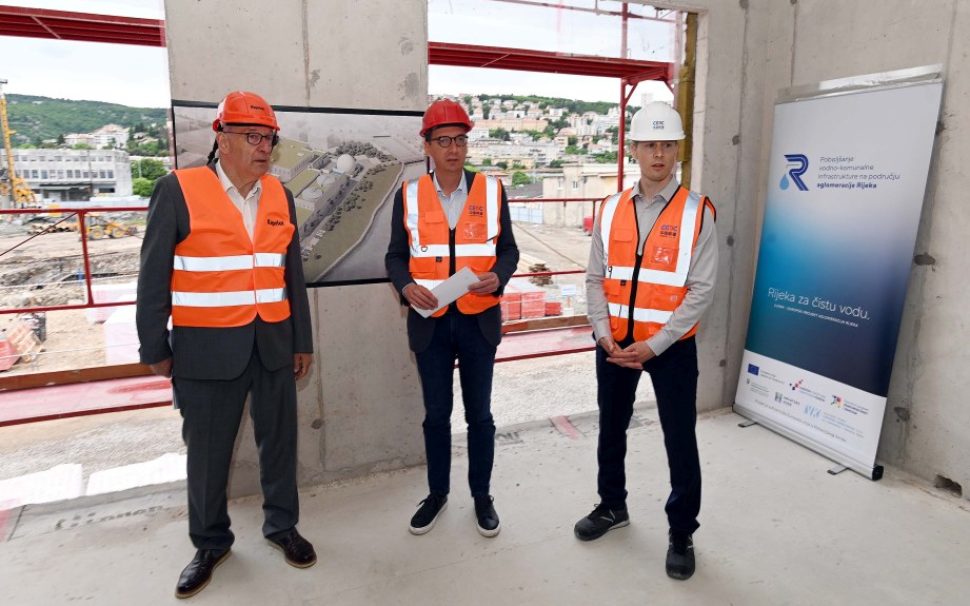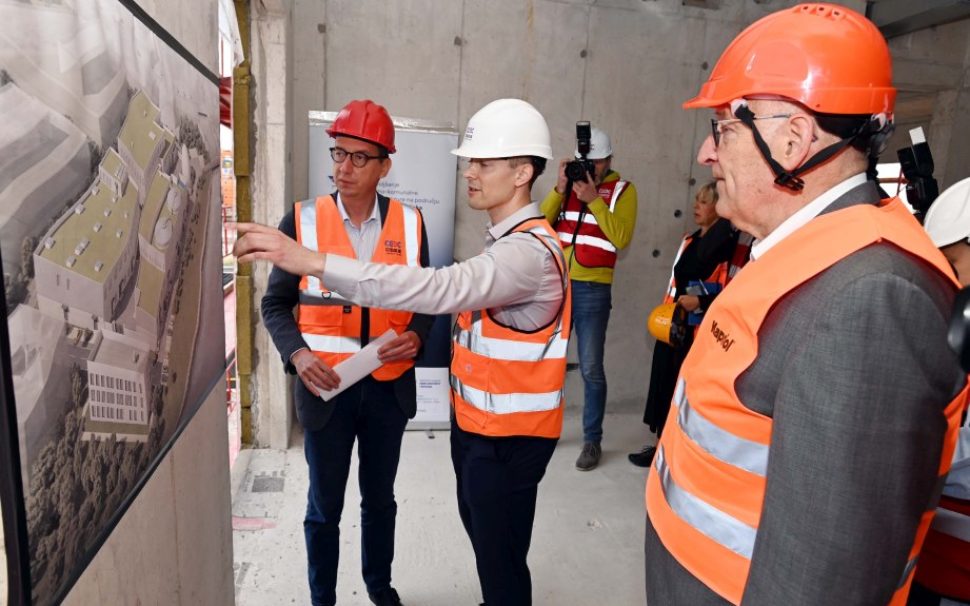Rijeka, 8 May 2025 – Accompanied by the director of KD VODOVOD I KANALIZACIJA d.o.o. Andrej Marochini, contractors, associates and media representatives, the Mayor of the City of Rijeka Marko Filipović visited the construction site of the new Wastewater Treatment Plant (WWTP) as part of the project “Improvement of the water communal infrastructure – Rijeka Agglomeration” co-financed by the European Union from the Cohesion Fund.

The new Wastewater Treatment Plant for the Rijeka Agglomeration will have a treatment capacity for a load of 200,000 population equivalents and a maximum flow of 1,000 liters per second. It will be based on biological wastewater treatment processes, with a septic tank content reception station, biogas production from sewage sludge for its own energy needs and thermal sludge drying. Wastewater will be biologically treated before being discharged into the sea, and the sludge will be treated and dried to a minimum dry matter content of 90 percent.
“This is an extremely large and important project and represents an investment in the future of Rijeka. This project is not just a major infrastructure project, this is a generational project that renews kilometers of water supply and sewage networks throughout Rijeka and its surroundings, which is also a confirmation of our responsibility towards the environment and the health of citizens. We are significantly improving the protection and quality of our sea and the preservation of marine habitats, making Rijeka an example of sustainable development and respect for European standards. The works on the construction of the new purifier are progressing according to plan, and I would like to thank everyone involved for their professionalism and dedication. Given the results and progress so far, I am convinced that this project will bring long-term benefits to the environment and the quality of life of our fellow citizens, which only confirms the fact that Rijeka is a city that invests in its future and builds on the foundations of responsibility, progress and sustainable development,” said Marko Filipović, Mayor of the City of Rijeka.

All parts of the new facility will be located in closed buildings, near the existing facility on Delta. In addition to the technological facility, the WWTP administration building, roads and public green areas will be built.
“We are pleased to see that the construction of the new Wastewater Treatment Plant is progressing well. Building permits have been obtained for all five planned phases of work. Work is now underway on the Administration Building, more precisely, all reinforced concrete works have been completed and preparations have begun for the continuation of trade and installation works. In addition, work is being accelerated on the excavation and laying of the foundations of the sludge treatment building, the biological treatment facility and the retention pool. We welcome all efforts to complete all works within the agreed deadline because we want to ensure a higher level of wastewater treatment for our fellow citizens in accordance with European standards as soon as possible and thus better environmental protection in our area,” said Andrej Marochini, director of KD VODOVOD I KANALIZACIJA d.o.o.

The value of the contracted works is EUR 69,360,939.73 (excluding VAT), or EUR 86,701,174.66 including VAT. The contractor is the consortium of bidders China Energy Engineering Group. Completion of the works is expected in mid-2027.
The construction of a wastewater treatment plant will contribute to the protection of the coastal sea and the Rijeka waters, the preservation of marine habitats and species, the reduction of pollution and the protection of human health.

As a reminder, the new Wastewater Treatment Plant is being built as part of the “Improvement of the water communal infrastructure – Rijeka Agglomeration” Project, co-financed by the European Union from the Cohesion Fund. In addition to the construction of the new WWTP, works are being carried out as part of seven other groups of works on the construction and optimization of the public drainage system, which will include the construction of 217 km of sewage pipelines, 125 sewage pumping stations, 12 retention basins, 20 storm overflows, 3 grease and oil separators, and the reconstruction of 100 km of water supply. So far, more than 55 km of sewage pipelines, 25 km of water supply, 1,480 new sewage connections, 600 new water supply connections and at least 22 other supporting facilities (pumping stations, retention basins, storm overflows and grease and oil separators) have been constructed.
